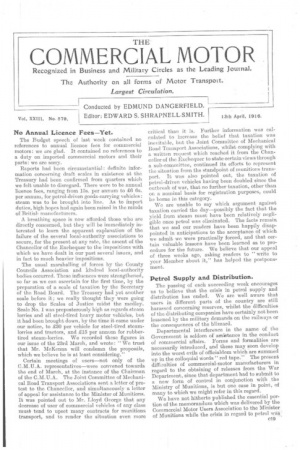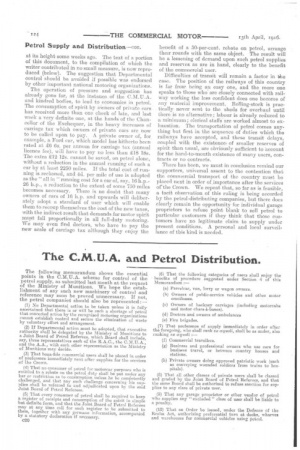No Annual Licence Fees—Yet.
Page 1

Page 2

If you've noticed an error in this article please click here to report it so we can fix it.
The Budget speech of last week contained no references to annual licence fees for commercial motors: we are glad. It contained no references to a duty on imported commercial motors and their parts : we are sorry.
Reports had been circumstantial : definite information concerning draft scales in existence at the Treasury had been confirmed from quarters which we felt unable to disregard. There were to be annual licence fees, ranging from 15s. per annum to £6 6s. per annum, for petrol-driven goods-carrying vehicles: steam was to be brought into line. As to import duties, high hopes had again been raised in the minds of Britisb manufacturers.
A breathing space is now afforded those who are directly concerned, but they will be immediately interested to learn the apparent explanation of the failure of the several local-authority associations to secure, for the present at any rate,, the assent of the Chancellor of the Exchequer to the impositions with which we have dealt in our past several issues, and in fact to much heavier impositions.
The usual marshalling of forces by the County Councils Association and kindred local-authority bodies occurred. These influences were strengthened, so far as we can ascertain for the first time, by the preparation of a scale of taxation by the Secretary of the Road Board. The Treasury had yet another scale before it; we really thought they were going to drop the Scales of Justice midst the medley. Scale No. 1 was preposterously high as regards steam lorries and all steel-tired heavy motor vehicles, but it had been brought down, by the time it came under our notice, to £30 per vehicle for steel-tired steamlorries and tractors, and £15 per annum for rubber. tired steam-lorries. We recorded these figures in our issue of the 23rd March, and wrote : "We trust that Mr. McKenna will condemn the proposals, which we believe he is at least considering."
Certain meetings of users—not only of the C.M.U.A. representatives—were convened towards the end of March, at the instance of the Chairman of the C.M.U.A. The Joint Committee of Mechanical Road Transport Associations sent a letter of protest to the Chancellor, and simultaneously a letter of appeal for assistance to the Minister of Munitions. It was pointed out to Mr. Lloyd George that any decrease of user of commercial vehicles of any class must tend to upset many contracts for munitions transport, and to render the situation even more critical than it is. Further information was caleulated to increase the belief that taxation was inevitable, but the Joint Committee of Mechanical Road Transport Associations, whilst complying with a written request which reached it from the Chancellor of the Exchequer to state certain views through a sub-committee, continued its efforts to represent the situation from the standpoint of munitions transport. It was also pointed out, the taxation of petrol-driven vehicles having been doubled since the outbreak of war, that no further taxation, other than on a nominal basis for registration purposes, could be borne in this category.
We are unable to say which argument against taxation carried the day—possibly the fact that the yield from steam must have been relatively negligible once petrol was eliminated. The facts remain that we and our readers have been happily disappointed in anticipations to the acceptance of which we admit we were practically forced, and that certain valuable lessons have been learned as to procedure for the future. We believe that our appeal of three weeks ago, asking readers to "write to your Member about it," has helped the postpone, m.ent.
Petrol Supply and Distribution.
The passing of each succeeding week encourages us to believe that the crisis in petrol supply and distribution has ended. We are well aware that users in different parts of the country are still harassed concerning reserves, whilst the difficulties of the distributing companies have certainly not been lessened by the military demands on the railways or the consequences of the blizzard. Departmental interference in the name of the Government is seldom of assistance in the conduct of commercial affairs. Forms and formalities are necessarily introduced, and these may soon develop into the worst evils of officialdom which are summed up in the colloquial words "red tape." The present diffieulties of commercial-motor manufacturers in regard to the obtaining of releases from the War Department, since that department had to submit to a new form of control in conjunction with the Ministry of Munitions, is but one case in point, of many to which we might refer in this regard. We have not hitherto published the essential portion of the memorandum which was delivered by the Commercial Motor Users Association to the Minister of Munitions while the crisis in regard to petrol wda at its height some weeks ago. The text of a portion of this document, to the compilation of which the writer contributed in no small measure, is now reproduced (below). The suggestion that Departmental control should be avoided if possible was endorsed by other important national motoring organizations.
The operation of pressure and suggestion has already gone far, at the instance.. of the C.M.U.A. and kindred bodies, to lead to _economies in petrol. The consumption of spirit by owners of private ears has received more than one check of late, and last week a very definite one, at the hands of the Chancellor of the Exchequer, in the heavy increases of carriage tax which owners of private cars are now to be called upon to pay. A private owner of, for example, a Ford car, which model has hitherto been rated at :€6 6s. per annum for carriage tax (annual licence fee), will have to pay no less than 18s.
The extra 12s. cannot be saved, on petrol alone, without a reduction in the annual running of such a car by at least 2250 miles. If the total cost of running is reckoned, and 4d. per mile of use is adopted as the' all in'' running cost for a car of, say, 16 h.p.26 h.p., a reduction to the extent of some 750 miles becomes necessary. There is no doubt that many owners of cars of 16 h.p. and upwards will deliberately adopt a standard of user which will enable them to recoup themselves the Cost of the new taxes, with the indirect result that demands for motor spirit must fall proportionally in all full-duty motoring. We may even find doctors, who have to pay the new scale of carriage tax although they enjoy the benefit of a 50-per-cent. rebate on petrol, arrange their rounds with the same object. The result will be a lessening of demand upon such petrol supplies and reserves as are in hand, clearly to the benefit of the commercial user. : Difficulties of transit will remain a factor in bile case. The position of the railways of this country is far from being an easy one, and the more one speaks to those who are closely connected with railway working the less confident does one become of any material improvement. Rolling-stock is practically never sent to the sheds for overhaul until there is no alternative ; labour is already reduced to a minimum ; clerie,a1 staffs are worked almost to exhaustion. The transportation of petrol comes anything but first in the sequence of duties which the railways have accepted, and these transit delays, coupled with the existence of smaller reserves of spirit than usual, are obviously sufficient to account for the hand-to-mouth existence of many users, contracts or no contracts.
There has been, we must in conclusion remind our supporters, universal assent to the contention that the commercial transport of the country must be placed next in order of importance after the services of the Crown. We repeat that, so far as is feasible, a tacit observation of this ruling is being accorded by the petrol-distributing companies, but there does clearly remain the opportunity for individual garage proprietors to refuse point blank to sell petrol to particular customers if they think that those customers have no legitimate claim to supply under present conditions. A personal and local surveillance of this kind is needed.






















